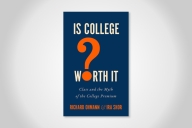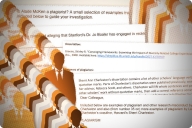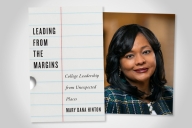You have /5 articles left.
Sign up for a free account or log in.
Politicians (mostly conservative) have perpetuated a narrative of college students, even before the election of President Trump. They have depicted campus activists as "snowflakes," overly sensitive, irrational and unbending in their beliefs. It is a depiction that has caused lawmakers to zero in on college campuses in a new way. Trump himself signed an executive order barring federal funds to colleges that do not meet free speech obligations.
Panic Attack: Young Radicals in the Age of Trump (St. Martin’s Press), the first book from Robby Soave, a rising young libertarian author and editor for Reason -- a libertarian publication -- does little to dispel these myths. The book is out this week.
In Soave's view, many of the causes for which these students fight are being marred by unnecessary infighting and political correctness, or with sexual assault issues and overreach by the federal government in telling institutions how to adjudicate such cases.
Soave delivers blazing critiques of progressive student activists -- their fondness for "trigger warnings," for instance, which he writes can be invoked regarding virtually anything uncomfortable. He said in a recent interview with Inside Higher Ed, though, that his intent is not to portray the situation on college campuses as a “crisis.” Rather, Soave said, he is trying to help moderate-to-center Democrats identify warning signs. Soave said he hopes these liberals will see the scenarios unfolding and will step in before free speech rights are further “trampled,” to ensure due process in college sexual assault proceedings is restored and no longer disregarded in “kangaroo courts.”
Soave said he was inspired to write about these issues following a series of incidents in 2015. The first were the racial protests at the University of Missouri at Columbia that exploded into the national forefront, and the second involved two Yale University professors. Nicholas A. Christakis, and his wife, Erika, resigned from their positions as head and associate head of Silliman College following an email Erika sent to students questioning whether Yale should be policing offensive Halloween costumes.
After he started writing about higher education more, Soave said with his libertarian background he was concerned by the language students were using in some cases -- particularly those attending elite colleges -- that seemed to suppress the views of those with which they did not agree. He said he was worried by the fact that some students consider free speech "harmful."
This manifested in a number of ways, in Soave’s opinion. He continually refers to the faults with intersectionality in his book, not as a concept generally but how it is applied to activism, he said.
For instance, if feminists do not consider a black woman’s view or a transgender woman’s view, then they are not “being intersectional” and can be excluded from the movement, Soave said. He identifies the Women’s March as an example of this conflict among feminists, in which certain advocates were angry more women of color and trans women were not involved in organizing it.
This unwillingness to hear out certain opinions is much more evident in Soave’s free speech chapter, though. Here, he discusses how the Free Speech Movement, which originated at the University of California, Berkeley, originally benefited liberal activists. He questions why students do not seem to support the concept of free expression.
He said that students seem to believe that free speech -- and in students’ views, offensive speech -- can actually inflict harm and jeopardize safety. Soave runs through some of the more significant shout downs of controversial speakers, namely Charles Murray, a social scientist many view as racist, who was drowned out at Middlebury College in 2017.
Soave also discusses how the anti-fascist movement, commonly referred to as antifa, has encroached on campuses in violent ways. This was most notably the case at Berkeley, where outsiders who subscribed to antifa caused widespread destruction, literally setting part of the campus ablaze when Milo Yiannopoulos, the former Breitbart editor, attempted to speak there in 2017.
Though Soave does note that many of these perpetrators were unaffiliated with the campus, the image he creates of Berkeley is particularly unflattering and consistent with conservatives who feel that free speech is being suppressed. Soave links the students to this behavior, saying they did not want Yiannopoulos on the campus.
In the interview, Soave acknowledged that the Berkeley students were the ones who were not violent -- but that didn't matter -- "they still didn't want him there," he said. Soave does not note that the administration publicly stated that Yiannopoulos had a right to speak on campus and devoted resources to trying to make that possible
Soave said he does not want to promote “absolute alarmism." He does not feel free speech has reached a crisis point (Soave disagrees with the Trump free speech order) but he also believes what is happening on college campuses might “trickle into” workplaces, such as media companies and elsewhere. Soave pointed out that The Atlantic swiftly cut ties with Kevin Williamson, a longtime National Review staffer and arch-conservative, following 2018 backlash against his public statements. Most notably, Williamson posted on Twitter that abortion should be treated like homicide and those who seek abortions should be subject to the death penalty, preferably, in Williamson's view, by hanging.
Soave is unclear where this crisis attitude comes from -- he said he does not believe, as some other pundits do, that liberal professors are brainwashing students. On the contrary, Soave said in his research he found that professors are terrified to broach certain subjects in the classroom for fear of running afoul of the more outspoken progressive students who might take exception to their lessons, even in an academic sense. But he does maintain that some disciplines are more “activist oriented,” such as gender studies and those that study other races.
“I have tried to convince conservatives that I think the liberal professor theory is wrong,” he said.
Soave is more harsh and absolute in his criticism of the Obama administration's rules around Title IX of the Education Amendments of 1972, which were largely credited with providing more protections for sexual assault survivors. While Title IX practitioners have continued to defend Obama’s guidance around the federal sex antidiscrimination law, saying that the guidelines were strong but institutions may have misinterpreted them, Soave wholeheartedly does not support them. In the book, Soave writes that he does believe sexual assault "is all too common, on campus and off."
"The debate is over the size, scope and shape of the problem," Soave wrote. "With activists often taking the most extreme position that patriarchal forces systematically oppress and violate women, particularly women who are, for identity-based intersectional reasons, extra susceptible to marginalization."
He said that the guidance, which came in the form of a Dear Colleague letter in 2011, caused institutions and administrators to overstep and has resulted in some truly farcical Title IX cases. Obama’s guidance was rescinded by Education Secretary Betsy DeVos, who offered new draft regulations that have yet to be approved by the department. They largely undo the Obama rules and give more latitude to colleges and universities in investigating and adjudicating such matters. Soave said that he’s not particularly optimistic that administrators will change much of anything around Title IX -- in fact, they are likely to double down on their practices given the public’s sensitivity to sexual assault.
Soave said (without data to back this up) that the adjudicators who sit on Title IX panels have a natural bias and tend to side with those accusing others of sexual assault.
“Automatically believing the victim and the application of that mind-set to these cases is disastrous,” Soave said.








